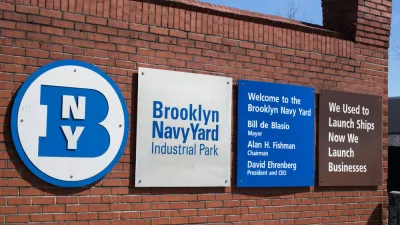The focus of a series of failed proposals, a 20-acre corner of Brooklyn Navy Yard known as the Naval Annex Historic Campus is set to be converted into a $400 million media, technology and film hub in a plan announced this week.
Julie Satow reports on the redevelopment plan being proposed by the nonprofit Brooklyn Navy Yard Development Corporation and a private developer, Douglas C. Steiner, which, contingent upon city, state and federal financing, could transform "20 acres of abandoned grassy hills, crumbling Greek Revival mansions and
Second Empire structures that few New Yorkers have ever seen."
Seeking to take advantage of a growing demand from technology, new media, and entertainment companies for work space in New York, the project, "would use the nine historical
buildings on the site and create five new structures for a total of
328,000 square feet, housing media companies and academic programs.
There would also be 100,000 square feet of new stages for film and TV,
including the first underwater stage in the country and the first back
lot on the East Coast to feature a New York City streetscape," notes Satow.
Securing public financing to the tune of $37.5 million, "To make the plan viable and to build out the site's infrastructure," is an essential element for moving the project forward.
FULL STORY: From Weeds and Bricks to Media Hub in Brooklyn

Planetizen Federal Action Tracker
A weekly monitor of how Trump’s orders and actions are impacting planners and planning in America.

Maui's Vacation Rental Debate Turns Ugly
Verbal attacks, misinformation campaigns and fistfights plague a high-stakes debate to convert thousands of vacation rentals into long-term housing.

Restaurant Patios Were a Pandemic Win — Why Were They so Hard to Keep?
Social distancing requirements and changes in travel patterns prompted cities to pilot new uses for street and sidewalk space. Then it got complicated.

In California Battle of Housing vs. Environment, Housing Just Won
A new state law significantly limits the power of CEQA, an environmental review law that served as a powerful tool for blocking new development.

Boulder Eliminates Parking Minimums Citywide
Officials estimate the cost of building a single underground parking space at up to $100,000.

Orange County, Florida Adopts Largest US “Sprawl Repair” Code
The ‘Orange Code’ seeks to rectify decades of sprawl-inducing, car-oriented development.
Urban Design for Planners 1: Software Tools
This six-course series explores essential urban design concepts using open source software and equips planners with the tools they need to participate fully in the urban design process.
Planning for Universal Design
Learn the tools for implementing Universal Design in planning regulations.
Heyer Gruel & Associates PA
JM Goldson LLC
Custer County Colorado
City of Camden Redevelopment Agency
City of Astoria
Transportation Research & Education Center (TREC) at Portland State University
Jefferson Parish Government
Camden Redevelopment Agency
City of Claremont





























